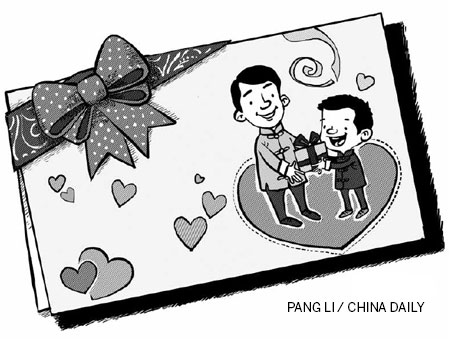
An increasing number of people in their 20s and early 30s seem to be celebrating Western festivals and losing interest in traditional Chinese festivals. They are doing so perhaps because they find it difficult to spend Chinese holidays in the traditional way. For example, many people complain that the Dragon Boat Festival is only about rice dumplings and, hence, they prefer celebrating festivals like Father's Day instead. Youths are becoming interested in Western festivals such as Father's Day and Mother's Day especially because they give them the chance to show their love for their parents.
Until quite recently, Chinese people used to look forward to traditional festivals like the Dragon Boat Festival. Not long ago, grandmothers and mothers used to put all their love and energy into making zongzi, a pyramid-shaped glutinous rice dumpling stuffed with dates and red beans and wrapped in bamboo leaves. Cleaning the house and decorating the doors with mugwort leaves and calamus, which emit a special aroma that wards off mosquitoes, flies and other insects, were part of the preparations.
But what children used to enjoy most was wearing a colorful, fragrant silk pouch and tying five-color silk threads around their wrists and ankles, which were supposed to be removed and thrown into a river only after the first summer rain, because it was believed that would protect them from diseases. Today very few parents, especially those who live in cities, follow the custom and not many shops and stores sell the traditional articles.
Instead, foreign festivals such as Christmas are becoming a favorite among people, particularly the young. In fact, the older generation, too, enjoys celebrating them. Also, it is not uncommon to see malls and even some mom-and-dad shops selling roses and chocolates for Valentine's Day.
Some Chinese do find the changing trend unacceptable and see it as a "cultural invasion". A couple of years ago, a dozen scholars from several prestigious universities gave a joint call to ignore foreign festivals such as Christmas. They claimed that by blindly following the West, Chinese people were neglecting their traditional festivals and rich cultural traditions.
But the problem is not as serious as the scholars portrayed it to be. The majority of people who love celebrating Western festivals were born in the 1980s or 1990s, and thus find them more acceptable because they are more exposed to foreign cultures and festivals than the older generation.
Young Chinese people like Western festivals because they suit their taste and lifestyle. Given the pace and pressure of life today, people look forward to spending some real leisure time with family and friends, for which Western festivals seem to be best suited. In contrast, Chinese festivals are more about traditions and customs such as family reunions.
Another reason why Western festivals are becoming increasingly popular in China is the rapid improvement in Chinese people's living standards. Chinese festivals, which are mostly about food (for instance, rice dumplings for Dragon Boat Festival and moon cake for Mid-Autumn Festival), have lost their charm also because we can enjoy these delicacies throughout the year. And people no longer need to wait for special festivals to put on new clothes and enjoy lavish dinners.
Besides, many foreign festivals also conform to traditional Chinese values such as filial piety (Mother's Day and Father's Day) and giving thanks for the harvest (Thanksgiving). But foreign festivals also owe their popularity to the media and businessmen. As Western festivals become more commercial owing to their popularity, especially in cities, businesspeople are making every effort to design targeted promotional activities. And this commercialization has, to a certain degree, twisted the original connotation of festivals and is misleading consumers by subtly forcing them to accept the festivals as part of their own culture.
So to revive the importance of traditional festivals among Chinese people, measures should be taken to enrich their meaning and glory. The essence of such festivals should be made part of textbooks to enable students to understand their importance for Chinese culture. In more ways than one, this would help younger generations to grasp the real meaning of traditional festivals and customs.
Moreover, foreign festivals, which despite their Western romantic connotations, conform to traditional Chinese virtues should be used to remind young people of the traditional values in modern life.
We recommend:
